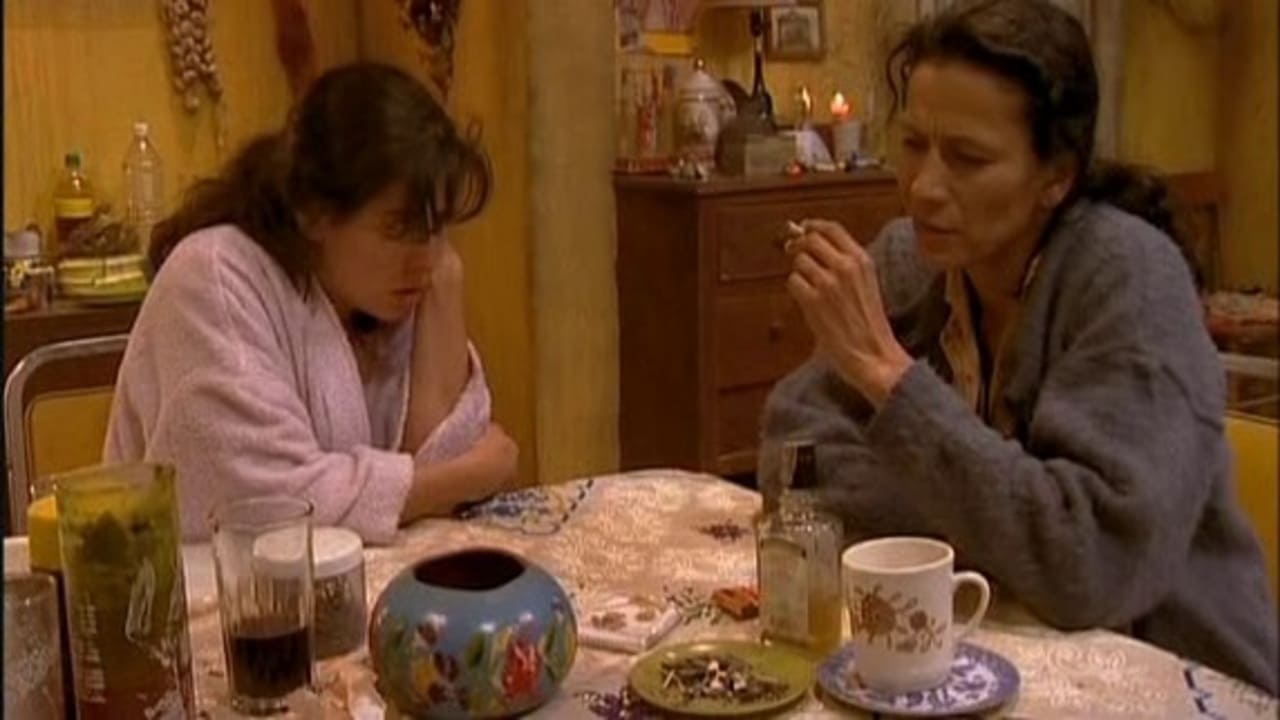

Ripstein and his wife and screen writer Paz Alicia Garciadiego have made a faithful version of the hideous tragedy of the Roman Seneca's Medea, moved and updated to a small, claustrophobic neighborhood in Mexico City. We watch as Julia, an abortionist and curandera, abandoned for a younger and richer woman by her husband, a small-time pugilist named Nicolas, maintains a self-destructive fury that ends in her murder of their two children. Even as a classicist, I am bothered rather than cheered by Ripstein's faithfulness to Seneca's tragedy. This is because Asi es la vida is theatrical rather than cinematic: except for showing the back of a mysterious silver van, an ambulance that may represent fate, Ripstein confines his mise-en-scene to interiors and exteriors that could have been stage sets. So, like Seneca's tragedy, the film feels static. Additionally, there is no development of the characters, who get angry and stay angry. Is it because he is in sympathy with Seneca that Ripstein misses the advantages of film? He does not paint with a world of images and memories to give a full picture of characters and to fill in the story. Instead, the subconscious of the Julia (the Medea character) and her almost ex Nicolas (the Jason character) close in rather than opening out cinematographically. The chorus could drive you crazy! It is a depressing mariachi band with an affectless boy listlessly shaking his marraccas who sing what Medea is feeling, first in her presence and later from a TV screen. Her stormy feelings are also read weather channel. The TV also stands in for Jason's lust, playing porn as he makes love to his new sweety. These devices, the chorus, the TV, and the mysterious van, rather than matching or contrasting images give the film coherence. If it is an anti-film, Asi es la vita does not add much to the dialog between men and women. Julia is every abandoned woman who has no identity and no value apart her husband and her children. Using Seneca's tragedy to tell us that little has changed in the war between men and women since Roman times is gratuitous. As Julia, Arcelia Ramirez is believable as she bangs her head against the wall and punches herself making her face bleed, to the accompaniment of the mariachis, but under Ripstein's direction I am afraid that the film is exploitative rather than revealing. A weird sense of humor undercuts the tragedy. The King figure, Julia's landlord and the father of Nicolas's love interest, for example is a hugely fat man who waddles around the barrio in a robe and slippers. The Pig, as he is known, along with the semi-serious mariachis, the weather channel and the porn films, the yellow cab in which Julia escapes after committing double murder all belong to the tradition of the theater of alienation. These devices are too small for the big screen. Ripstein's film does not make as good use of the techne and resources of cinema as Lars von Trier's or Pasolini's versions of Medea.
... View MoreThe format of this film is typically theatrical. There are many soliloquies in which the character tells us how hard life is, the misfortunes that have beset the family and the uncertainty of the future. There are discussions between mother and daughter, arguments between husband and wife, and threats from an unrelenting landlord. There is a very slow fade between the numerous scenes like a theatrical curtain change. Surprisingly there is also a chorus of four who appear at odd times with appropriate songs. They philosophize on life as in some Greek drama. And why not? This happens to be a modern Mexican version of the classical Greek play "Medea".I normally dislike modern versions of the classics....often experimental attempts at presenting something different that is rarely successful. Not so here. This is an amazing drama that should not be missed. It is so different, so unique, so powerful it will remain in your thoughts for days. What we see on the screen is no fairy story. It is as relevant to-day as in the days of ancient Greece. Just read the daily newspapers and you will see what I mean.Nicolas a young and not so successful boxer is supported by his wife Julia who dabbles in herbal mixtures and witchcraft to augment the family income. They have two young children. When Nicolas falls in love with the landlord's daughter and seeks a divorce, the future of the children becomes a major concern. The outcome is horrendous.Nicolas and Julia pour out their intimate thoughts as we watch the love that once they had for each other evaporate before our eyes. There is a sense of tragedy and impending doom wonderfully portrayed by the actors as we watch helplessly in desperation and the chorus from time to time reinforces our thoughts.I liked very much the summing up by Nicolas in the final scene. Whenever tragedy overtakes us, it is difficult to assert who is to blame. The message in the film seems to suggest that it is rarely the fault of one person. Indeed,we must all accept some share in the responsibility. Such is life!
... View MoreThe sublime, visual poeticness of `El Coronel no tiene quién le escriba' (qv), without any doubt one of the most beautiful films in Spanish from either side of the Atlantic, used beautiful photography, music and two excellent actors to build up an exquisitely atmospheric film evoking sincere pathos, such that the impact is tenderly psychological.With `Así es la Vida' all that has gone; the subtleties of `El Coronel no tiene quién le escriba' (Gabriel García Marquez) are thrown out in favour of double-handed axe blows which obviate the outcome way before you get there. It seems as if Arturo Ripstein sought to bombard the spectator into oblivion with a pathologically overwrought story reaching extremes of visual violence which are not really justified. In this, his wife, Paz Alicia Garciadiego, is to blame. Her careful adaptation of Gabriel García Marquez's short novel, here becomes a `machaconic' bombast of disproportionate savagery. The film kills itself from its own blunt heavy-handedness, such that one tends to think that Mrs. Garciadiego-Ripstein was hell-bent on vomiting up her own masochistic `macho' feelings, rather than telling the story in a more heart-felt way: the result on the viewer may well have been just as powerful, without resorting to such exaggerated extremes.Neither the presence of Tovar nor Yáñez lend much to the proceedings, unfortunately: the film derails around them. Added to that is the frustration of trying to work out a very marked Mexican accent which often left me half-guessing some of the dialogues. I do not usually have any difficulty with the regional varieties of Spanish on the American side of the Atlantic, but in this film, the going was definitely `muy chingadera'.I hope that a far better conclusion can be made after seeing the next Ripstein-Garciadiego film `La Virgen de la Lujuria' with Ariadna Gil and Juan Diego. If not, I can only suggest that Ripstein change scriptwriter, if not wife ..
... View MoreOf course it´s Ripstein. A great mexican director. In this movie he makes a very personal adaptation, to the México of our times, of the classical greek tragedy MEDEA. With a very sordid scenario and a really complex narrative. Using a TV like flashbacks and thoughts of the characters and like the place for the mariachis that plays the role of the classical Chorus of the greek theatre, this movie is a real masterpiece of our times.This, is the first movie of latin american that has been made in a DV format. And this shows a possible future for the low budget productions.
... View More